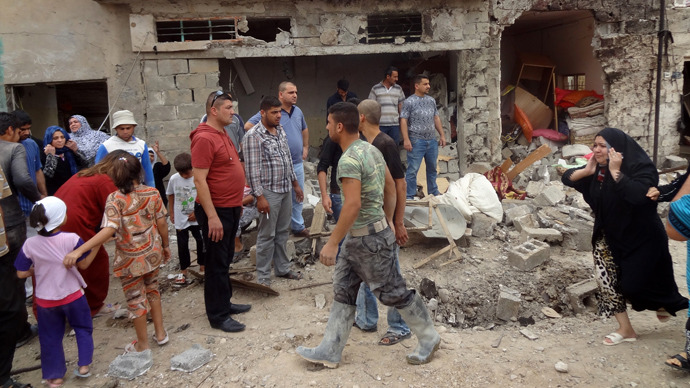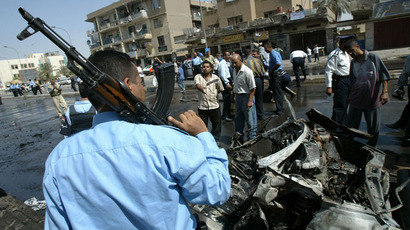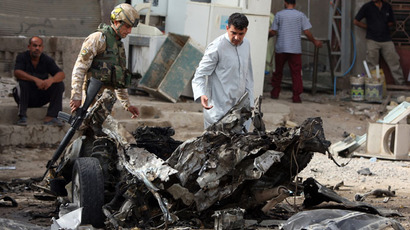Blasts kill over 35 in Iraq as sectarian violence spikes

Several bombings targeting Baghdad’s main Shi’ite district as well as in Kirkuk left more than 35 dead on Wednesday as part of Iraq’s continuing sectarian violence.
Several bombings targeting Baghdad’s main Shi’ite district as
well as in Kirkuk left more than 35 dead on Wednesday as part of
Iraq’s continuing sectarian violence.
Several car bombs in Baghdad, including one detonated outside a
cafe and another next to a market, left at least 22 dead and
dozens wounded according to a Reuters report.
These explosions came after 10 people were killed after two car
bombs were detonated near government buildings in the ethnically
diverse city of Kirkuk. Another suicide bombing was reported near
a police patrol in northern Baghdad, leaving two officers dead,
while an additional roadside bomb killed a policeman near Mosul,
240 miles north of the capital.
The string of blasts are thought to be linked to Sunni Islamist
insurgents who seek to further destabilize relations between
Iraq’s Sunni Muslim minority and its Shi’ite population who now
lead the country.

Iraq’s Al Qaeda wing, the Islamic State of Iraq, and additional Sunni groups seem to be tapping into the ongoing civil war in neighboring Syria to stoke tensions among the country’s Sunnis.
Violence in Syria has in the last few months taken a decidedly sectarian path, with Sunni rebels intent on removing president Bashar Assad from power, himself a member of the Alawite branch of Shi’ite Islam.
Meanwhile, Iraq’s coalition government, which is comprised of Shi’ite, Sunni and Kurdish blocs, continues to experience deadlock. In addition to sectarian conflicts between Sunni and Shi’ite, a movement for a self-rule region of Iraq by Kurds introduces a third source of conflict.
The oil-rich region of Kirkuk, home to Arabs, Kurds and Turkmen, is one region Iraq’s Kurds want to appropriate as part of their semi-autonomous region.
"I saw a bright flash followed by a strong explosion that shook the building. Glass was shattered everywhere, people immediately ran to the scene and started evacuating the wounded and the dead," said Jabar al-Rubaie, a policeman at the scene in Sadr City district in Baghdad who spoke with Reuters.
Sectarian violence has spiked, and led to almost daily attacks by Sunni insurgents since US forces withdrew from Iraq in 2011, although it still fails to match the bloodshed of 2006-7 when tens of thousands were killed throughout Iraq.
Sunnis, who held a position of privilege under Saddam Hussein, complain of second-class treatment by the Shiite leadership, and have been protesting laws which they believe unfairly target them.
Relations worsened in late April, after Iraqi government troops clashed with Sunni demonstrators in the town of Hawija, which lies north of Baghdad. That incident is thought to be linked to a wave of violence that has left more than 230 dead, according to an Associated Press report.
There were no immediate claims of responsibility for Wednesday’s bombings, though car bombings and suicide attacks have been attributed to Al Qaeda’s Iraq insurgency in the recent spate of violence.














